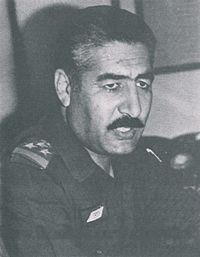Ayad Futayyih Al-Rawi
Ayad Futaih al-Rawi | |
|---|---|
 Al Rawi in 1985 is Brig. Gen. | |
| Native name | إياد فتيح خليفة الراوي |
| Born | 1942 Rawa, Iraq |
| Died | 18 May 2018 (aged 76) Baghdad, Iraq |
| Allegiance | |
| Service/ | Iraqi Army |
| Years of service | 1965–2003 |
| Rank | |
| Unit | Republican Guard Jerusalem Army |
| Commands held | Jerusalem Army Chief of Staff |
| Battles/wars |
|
Ayad Futayyih Khalifa al-Rawi (Arabic: إياد فتيح خليفة الراوي) (1942 – 18 May 2018[1]) was an Iraqi general of the Iraqi Republican Guard, and later served as the head of the Jerusalem Army. He started his service in the Army as an officer in an armoured unit,[2] later fighting in the Iran–Iraq War, receiving numerous medals and suffering a severe head wound whilst leading an Iraqi counterattack against an Iranian offensive. In total Rawi was awarded 27 medals during the Iran–Iraq War. He was perceived to be a staunch Saddam loyalist.[3]
Rawi was born in Rawa in 1942,[4][5] and died of a stroke in Baghdad on May 18, 2018.[6]
Iran–Iraq War[]
He served as commander of the Republican Guard forces at the second battle of Al Faw, which comprised some 60% of the forces deployed.[7]
During his interview with the Iraqi Perspectives Project, al-Rawi was named by General Hamdani as one of the few first-rate commanders.[8] Hamdani lists one of the few reasons why Hussein Kamel's attempts to improve the quality of the Republican Guard during the Iran-Iraq War was successful was that he listened to al-Rawi.[9]
Later career[]
Rawi went on to serve as Governor of both Baghdad and Ta'mim Governorates.[4]
He later became the Chief of Staff of the Al Quds Volunteer Army; a paramilitary force created in early 2001 in response to the beginning of the Second Intifada. The force's objective was seemingly to defeat Israel and liberate Palestine and Jerusalem, and the force was declared to be composed of some 21 divisions and 7 million Iraqis, although in actuality the force was largely a propaganda stunt to show support for the Palestinians, and the force was small and ineffective.[10]
Prior to the 2003 Invasion of Iraq Rawi was on a list of sanctioned individuals.[4]
Invasion and aftermath[]
Rawi was arrested on 4 June 2003, following the U.S.-led invasion of Iraq. He was no. 30 of Central Commands Top 55 list, appearing as the seven of clubs in the Most-wanted Iraqi playing cards.[11] Despite its claimed size, the Al Quds Army ended up playing virtually no role in the war[12]
In 2008 Rawi received a life sentence for war crimes committed in the suppression of the 1991 uprisings in Iraq.[13] He died in 2018 in prison.
References[]
- ^ http://m.thebaghdadpost.com/en/Story/27485
- ^ Woods, Kevin M. (2011) [2010]. Saddam's Generals: Perspectives of the Iran–Iraq War. 4850 Mark Center Drive, Alexandria, Virginia: Institute for Defense Analyses. p. 82. ISBN 9780160896132.CS1 maint: location (link)
- ^ "Saddam's Inner Circle – Gen. Iyad Futiyeh Al-Rawi". CBS News. Archived from the original on 22 April 2012.
- ^ a b c "EUR-Lex - 32003R1210 - EN - EUR-Lex".
- ^ The Code of Federal Regulations of the United States of America. U.S. Government Printing Office, 1983. 1 July 2004. p. 1039.
- ^ "وفاة اياد فتيح الراوي قائد الحرس الجمهوري في جيش صدام". Archived from the original on 12 June 2018. Retrieved 18 May 2018.
- ^ Woods, Kevin M. (2011) [2010]. Saddam's Generals: Perspectives of the Iran–Iraq War. 4850 Mark Center Drive, Alexandria, Virginia: Institute for Defense Analyses. p. 83. ISBN 9780160896132.CS1 maint: location (link)
- ^ Woods, Kevin M. (2011) [2010]. Saddam's Generals: Perspectives of the Iran–Iraq War. 4850 Mark Center Drive, Alexandria, Virginia: Institute for Defense Analyses. p. 43. ISBN 9780160896132.CS1 maint: location (link)
- ^ Woods, Kevin M. (2009). "Saddam's War: An Iraqi Military Perspective of the Iran–Iraq War". Mcnair Papers. Washington, D.C.: Institute for National Strategic Studies, National Defence University: 14. ISBN 9780160827372. ISSN 1071-7552.
- ^ John Pike (16 January 1998). "People's Army / Popular Army / People's Militia (Al Jaysh ash Shaabi)". Globalsecurity.org. Retrieved 4 November 2015.
- ^ "CNN.com – U.S. captures Iraqi on 55 Most Wanted list – Jun. 5, 2003". Edition.cnn.com. 5 June 2003. Retrieved 4 November 2015.
- ^ Roberts, Joel (7 June 2003). "U.N. Nuke Experts Back In Iraq". CBS News.
- ^ "Former Iraqi officers receive various sentences in Shiite upraising case 02/12/2008". KUNA. 21 August 2008. Retrieved 4 November 2015.
- 1942 births
- 2018 deaths
- Governors of Baghdad Governorate
- Governors of Kirkuk Governorate
- Iraqi generals
- Iraqi soldiers
- Iraqi prisoners sentenced to life imprisonment
- Prisoners and detainees of the United States military
- Prisoners sentenced to life imprisonment by Iraq
- Deaths from cerebrovascular disease